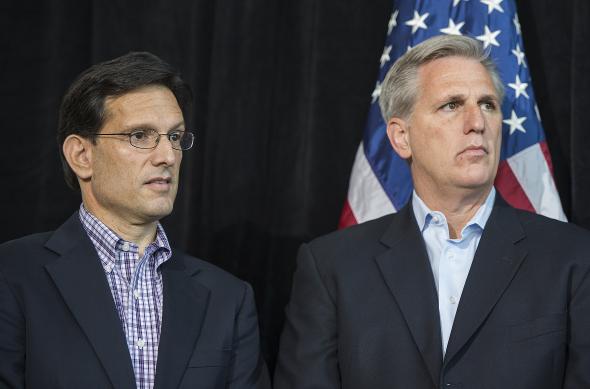Republicans Are Expected to Win Big This Fall. Why Are They Worried?

Photo by Jim Watson/AFP/Getty Images
Conservatives should be in a good mood. Their party is poised to gain a majority in both houses of Congress this fall. History and polls are both in their favor: Off-year elections tend to have older, whiter voters and are tipped against the president's party. Ten Senate seats could flip Republican, predicts the New York Times. Nate Silver thinks they'll win six; Larry Sabato of UVA's Center for Politics is guessing four to eight. Gains are expected in the House that will further increase the Republican majority—a dozen Democratic incumbents in the House are facing tossup races. Pundits think the size of the loss will hinge on the president's approval ratings, currently at a paltry 42 percent among likely voters.
Yet the Republicans' anticipation is mixed with unease. Last week I went to a discussion called “Conversations with Conservatives” that’s put on by some “free market and liberty-minded members” of the House every month. Most of the talk was actually fretting—specifically about what to do if Republicans win their much-anticipated majority in both houses. Rep. Raul Labrador, one of the members who chairs the monthly gathering, lamented that Republicans think too much about elections and not enough about governing. Labrador wondered if Republicans would have the resolve to get things done. As for winning the midterms, “Majorities are good, but majorities with a mandate are better,” sighed Rep. Jim Jordan, one of the other organizers.
Resistance to compromise is something of a right-wing creed, but a party in the majority is expected to govern—at least somewhat. So there are two less-than-ideal outcomes for hardline conservatives if Republicans take both houses. Passing bipartisan laws do these conservatives no favors with their base, but a Republican majority in both houses will make inaction hard to excuse.
The perils of this paradox may be felt by more than just conservative hardliners. As Sarah Binder of Brookings points out to me, the two years leading up to a presidential election is the best time for the party to define itself in opposition to the one currently in the White House. Democrats managed to do this in the waning years of George W. Bush’s administration to good effect. Now, with a country that is endlessly reported to be becoming “more polarized than ever,” Republicans likely see strategic sense in standing firm on ideological grounds—it might not lead to good policy, but it’s good politics for them. But stridency elevates the danger of alienating voters with two more years of do-nothingness. Seeing how little Congress has accomplished in the last several years, it’s not as though voters are expecting members to suddenly become models of productivity, especially during an election year. So, however worried they may be, expect Republicans to damn the consequences and risk everything on doing nothing.
